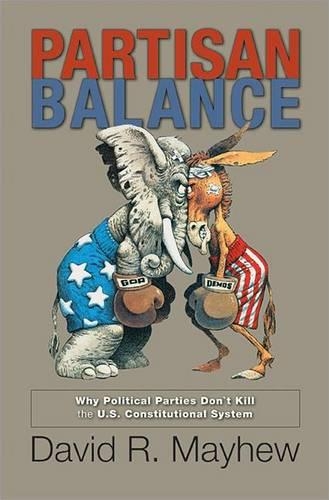
Partisan Balance: Why Political Parties Don't Kill the U.S. Constitutional System
(Paperback)
Publishing Details
Partisan Balance: Why Political Parties Don't Kill the U.S. Constitutional System
By (Author) David R. Mayhew
Princeton University Press
Princeton University Press
1st October 2013
United States
Classifications
Tertiary Education
Non Fiction
Central / national / federal government
Political science and theory
320.973
Physical Properties
Paperback
240
Width 152mm, Height 235mm
340g
Description
With three independent branches, a legislature divided into two houses, and many diverse constituencies, it is remarkable that the federal government does not collapse in permanent deadlock. Yet, this system of government has functioned for well over two centuries, even through such heated partisan conflicts as the national health-care showdown and
Reviews
Winner of the 2011 Leon D. Epstein Outstanding Book Award, Political Organizations and Parties Section of the American Political Science Association "Any time you read something David Mayhew has written, you end up learning something. His latest book, Partisan Balance, is no exception to that rule."--Matthew Yglesias, Matthew Yglesias blog "Armed with impressive datasets and thoughtful analysis, Mayhew makes the case that our constitutional system usually works the way that we want it to work... Mayhew is well respected by his peers, and Partisan Balance reminds the reader why he is such a trusted voice in political science... Readers wanting explanation and evidence for why the U.S. Constitution and the political system it established remain robust and vibrant will find many rewards in Mayhew's latest book."--Books & Culture "In this work, Mayhew pursues the question of whether presidential requests are affected by persistent partisan biases of the Senate and the House... This is an analysis of particular interest to those concerned about the dynamics of presidential-congressional interactions over legislation since WWII."--Choice "Typical of a David Mayhew contribution, this book is detailed and meticulous in its analysis, impeccably written and argued, and provides a range of thoughtful, provocative, and counter-intuitive claims. It is a worthy addition to Mayhew's esteemed cannon."--Paul Frymer, Political Science Quarterly "[Mayhew's] data set is quite rich, providing insights and posing issues that should keep political historians busy for some time."--Roger H. Davidson, Congress & the Presidency "What makes the book an enjoyable read is the care with which Mayhew outlines the fare of each proposal, his almost stream-of-consciousness discussion of how to handle methodological conundrums and ambiguous results, and his crisp conclusions once all avenues have been exhausted... This author's work usually leads me to more questions than answers, but this is of course a sign of a stimulating book."--Robin Kolodny, Perspectives on Politics
Author Bio
David R. Mayhew is Sterling Professor of Political Science at Yale University. His books include "Congress" and "Electoral Realignments".
